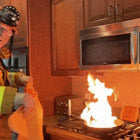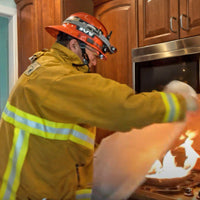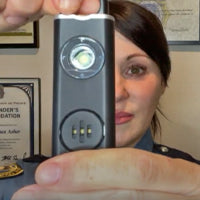Where you put your smoke detectors matters just as much as installing them. Proper placement makes sure they can detect...
Thinking about switching to wireless smoke detectors? You’re not alone. A lot of people choose them because of the convenience and quick setup. But how do they actually work? Are they as reliable as wired ones? Find out how wireless smoke alarms function, their pros and cons, and whether you need the internet to use them.
Can Smoke Detectors Be Wireless?

Yes, smoke detectors can be wireless. Instead of wires, they use radio frequency or Wi-Fi to warn you. Given this, wireless smoke detectors are easy to install. You don’t need an electrician or a hole in the wall. Most of them also run on batteries, so they’ll work during a power outage. Some models even let you control them from your phone.
Plus, smart wireless smoke detectors go off when one of them does. You can also link them together, depending on the brand. This is ideal for bigger homes because it makes sure everyone hears the alert. Just keep in mind that wireless smoke alarms might have a slight delay in syncing compared to hardwired ones. And like all safety devices, they need to meet safety codes and be tested regularly.
While smoke detectors are reliable, you need other fire prevention tools like fire blankets, flame shields, and fire sprays for better protection. Smoke detectors give you an early heads-up when there’s a fire, which gives you time to act fast. That’s where tools like fire sprays and fire blankets come in. Once the alarm goes off, you can use them to put out small flames or stop them from spreading.
Do Smoke Detectors Have to Be Wired In?
No, smoke detectors don’t have to be wired in. You can use wired or wireless smoke detectors depending on your preference and local codes. For instance, battery-operated smoke alarms are usually safe for older homes. However, new buildings or major renovations usually require wired smoke detectors based on fire safety codes.
Wired smoke detectors connect to your home’s electrical system and have backup batteries. This setup makes sure they work even if the power goes out. Plus, wired smoke alarms can be interconnected, so if one goes off, all of them go off. It’s a huge fire safety win for big homes, offices, and commercial buildings.
They’re also more reliable over time and don’t rely on battery power alone. However, they need to be installed by an electrician. No matter which kind you choose, just make sure they meet local safety codes and are tested regularly.
How Do Wireless Smoke Alarms Work?

Wireless smoke alarms work using radio frequency signals. When one alarm detects smoke, it sends a signal to the other alarms in the same series, so they all go off at once. This is helpful in big homes and offices because people will hear the alarm no matter where they are.
Each wireless smoke alarm has a sensor that’s usually photoelectric or ionization. When one detects smoke, the sensor gets triggered, and a signal is sent out. Other units in the same series will then activate the alarm. Some models can even tell you what kind of danger it is and where it’s happening using voice alerts.
Most wireless smoke alarms are battery-powered, so they’ll still work during a power outage. Many can also connect to your phone, so you get alerts even when you’re not at home or work. You also don’t need to handle wires because you can install them yourself. It’s a smart and simple way to keep your whole house or workplace protected.
How Long Do Wireless Smoke Detectors Last?
Wireless smoke detectors can last for up to 10 years. The exact lifespan depends on the model, the environment, and how well you maintain them.
You see, dust and debris can build up over time, which can mess with the sensors and make them less reliable. In addition, wireless smoke alarms are battery-powered, so you'll need to change the batteries at least once a year, according to the NFPA (National Fire Protection Association). If your wireless smoke detector starts beeping with a new battery or fails a test, it’s time to replace it, even if it’s less than 10 years old.
Some wireless models also have built-in carbon monoxide (CO) sensors. These typically have a shorter life of about 5 to 7 years. It’s because the CO sensors wear out faster. So, always check the manufacturer’s instructions for the exact lifespan.
What Is the Difference Between Wired and Wireless Smoke Detectors?

Wired and wireless smoke detectors warn you when there’s a fire, but they work differently.
Wired smoke detectors are directly connected to your home’s electrical system. They also have backup batteries if the power goes out. Also known as hardwired smoke detectors, they are reliable and interconnected. So, when one alarm goes off, they all do. This is great for larger homes where you might not hear an alarm from across the house. However, they’re more complex to install and often involve cutting into walls or ceilings.
On the other hand, wireless smoke detectors are usually battery-powered and use radio signals to connect with each other. They’re easier to install and move around, especially in older homes or rentals. However, their batteries have to be replaced at least once a year.
Wired systems are generally more reliable, while wireless ones are more convenient. Choosing between them depends on your home, budget, and how much flexibility you need.
Do You Need Wireless Smoke Detectors?
You don’t need wireless smoke detectors because you can use wired smoke detectors instead. Wired smoke detectors work just as well. If you already have wired detectors, there’s no real reason to switch unless you’re doing renovations or want something easier to move or install.
Wireless smoke detectors are ideal for older homes or rentals because you don’t have to deal with wires. They’re easier to set up and can still be interconnected to warn the whole house. Just remember to check and change the batteries regularly because dead batteries are the number one reason these alarms fail.
Bottom line: both wireless and wired smoke detectors do the job. You don’t have to go wireless unless it fits your setup better. You can use wired or wireless smoke alarms as long as you regularly test them.
What Are the Disadvantages of Wireless Smoke Detectors?

Wireless smoke detectors are convenient, but they’re not perfect. One disadvantage is that they rely on Wi-Fi for smart features like phone alerts or syncing with other devices. If your internet goes down, you won’t get those notifications, though the alarm will still sound during a fire.
Wireless smoke detectors also run on batteries, so you’ll need to replace the batteries at least once a year. Another thing to consider is cost. Wireless or smart smoke detectors usually cost more than basic battery-powered models. You’re paying for extra features, not necessarily better performance.
So while wireless smoke detectors offer flexibility and more features, they do have a few trade-offs. If you go this route, just make sure your Wi-Fi is solid and stay on top of maintenance.
Can You Install a Smoke Detector Without Wiring?
Yes, you can install a smoke detector without wiring. Battery-powered smoke detectors are made for that. You don’t need to use wires or hire an electrician. Just mount the detector to your wall or ceiling using the bracket it comes with, pop in the battery, and that’s it. Know more about smoke detector installation here.
These models usually use AA, 9-volt, or lithium batteries. They’re a solid option if you want something quick and simple. You can also get smart battery-powered detectors that connect with others in your home. Some brands even let you mix wired and battery-powered detectors using special adapters or bridge units.
How Reliable Are Wireless Smoke Detectors?

Wireless smoke detectors are reliable and popular because they’re easy to install and versatile. When one alarm goes off, all connected alarms sound. This gives you a heads-up no matter where the fire starts. The early warning can make a big difference if you live in a huge house.
Wireless smoke detectors are a convenient and effective option, especially for homes where wiring is tricky. Just remember to keep an eye on battery life and test your alarms regularly to stay safe.
Do You Need Internet for Wireless Smoke Alarms?
You don’t always need the internet for wireless smoke alarms. Most wireless alarms use radio frequency signals to communicate with each other. This means if one alarm goes off, they all do, even if there’s no Wi-Fi.
However, some smart wireless smoke alarms have extra features like mobile alerts or remote silencing. Those require a Wi-Fi connection to work. Some wireless alarms can also connect many devices on their own network without any internet at all. So, if you want simple, reliable alarms, you don’t need the internet. However, you need Wi-Fi if you want smart features.
Conclusion
Wireless smoke detectors are a solid choice if you want convenience and flexibility. Just make sure to regularly test them and change the batteries at least once a year. Plus, you don’t need the internet unless you want extra smart features. At the end of the day, the option you pick depends on your needs. Choose what’s best for you, stay on top of maintenance, and protect your loved ones.
Do you want reliable, easy-to-use, and affordable fire safety tools on top of your smoke detectors? Check out Prepared Hero’s fire prevention tools here, and get up to 51% off on certain items. Stay prepared, hero!


 Fire
Fire Safety
Safety Survival
Survival Protection
Protection New
New
 Fire
Fire Safety
Safety Survival
Survival Protection
Protection New
New












